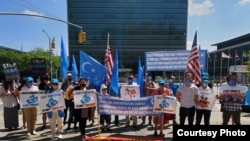Nearly two dozen activist organizations and 16 genocide experts are urging the U.N. Human Rights Council (UNHRC) to investigate China's campaign on Turkic Muslim minorities in China's Xinjiang Uighur Autonomous Region and "develop strategies" to end the alleged violations that, according to them, amount to acts of genocide.
Tuesday's open letter was signed by the Uyghur Human Rights Project, Genocide Watch, the European Center for the Responsibility to Protect, and other groups and individuals.
The letter said the Chinese government has used the guise of combating religious and political extremism for its "systematic policies" of crackdowns against Uighurs and other minorities, including the detention of 1 million to 1.8 million people in internment camps, political indoctrination, enforced disappearances, destruction of cultural sites, forced labor and coercive birth prevention.
It called on the international community to use "diplomatic, humanitarian and other peaceful means" to respond to the alleged crimes.
Commission of Inquiry
Peter Irwin, a senior program officer at the Washington-based Uyghur Human Rights Project (UHRP), told VOA he believed there was sufficient information on the Uighur issue to warrant the creation of a Commission of Inquiry by the UNHRC.
"Such a Commission of Inquiry is not without precedent. The U.N. sets up these bodies regularly to gather information, and analyze and report on violations of international law," Irwin said.
There are currently eight such commissions at the U.N., including the opening last month of a special investigation into Libya's alleged violations.
Irwin said such a proposal for investigating Xinjiang has been ignored mainly because of China's opposition and ability to rally its allies against it.
'Rumors and slanders'
The Chinese government has rejected accusations of human rights abuses in Xinjiang, saying it is only running a campaign of "transformation-through-education centers." Chinese officials have called the camps "vocational training" facilities for people who were exposed to "ideas of extremism and terrorism." Officials have also said the camps teach the people skills needed to undertake new jobs.
While China has dismissed any criticism of Western governments over Xinjiang as "neo-colonialism," it is more difficult to ignore this letter by genocide prevention activists, according to Kyle Matthews, executive director of the Montreal Institute for Genocide and Human Rights Studies at Concordia University in Canada.
"The significance of this letter is that most of the signatories are academics and university-based institutions that focus exclusively on the prevention and punishment of atrocity crimes, including genocide," said Matthews, whose institute was among the signatories to the letter.
"No amount of diplomatic spin or disinformation can take away the fact that the signatories of the letter are experts speaking truth to power."
Strategically located in China's western frontier, Xinjiang borders eight countries and consists of one-sixth of the country's total landmass. According to China's foreign ministry, there are over 12 million Uighurs in the region.
China's Foreign Ministry spokesperson Wang Wenbin earlier this week said the alleged abuses in Xinjiang were "nothing but rumors and slanders."
Wang denounced the accusations as foreign interference into China's domestic affairs, while at the same time, saying, "We always welcome friends from all over the world to visit Xinjiang and see with their own eyes the real situation there, instead of believing fabricated lies or hearsay."
The United Nations in the past has asked China for "unfettered access" to Xinjiang to investigate the alleged rights abuses. Chinese officials have said they would welcome U.N. officials, but only on the condition they do not meddle in the country's internal affairs.
U.N. High Commissioner for Human Rights Michelle Bachelet said on Monday she was discussing a possible visit to the region with Chinese authorities.
"My office continues to engage with the Chinese government on the situation in the Xinjiang Uyghur Autonomous Region and the impact on human rights of its policies," Bachelet told a council meeting in Geneva.




